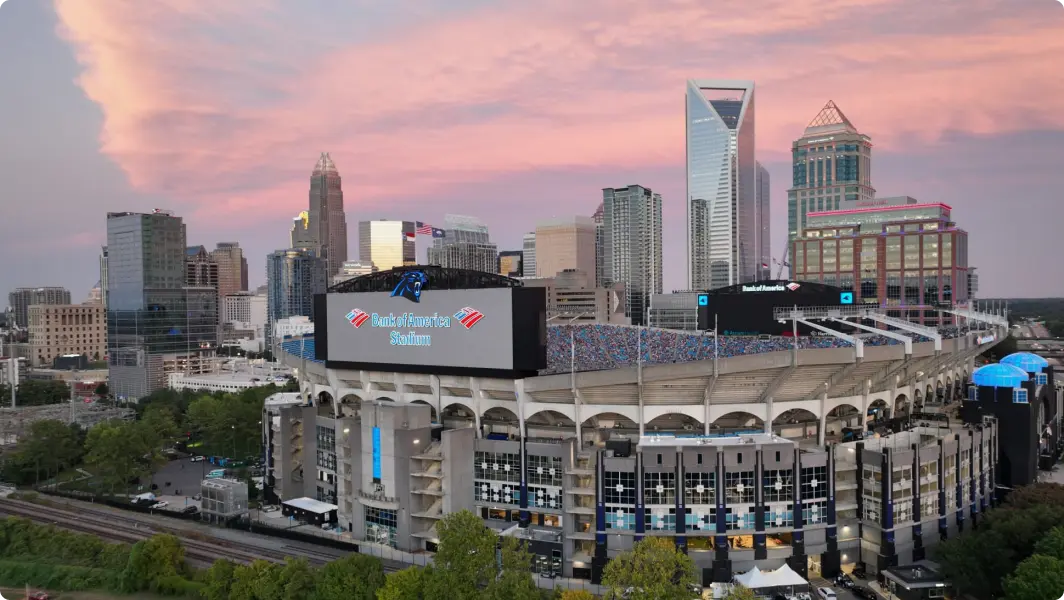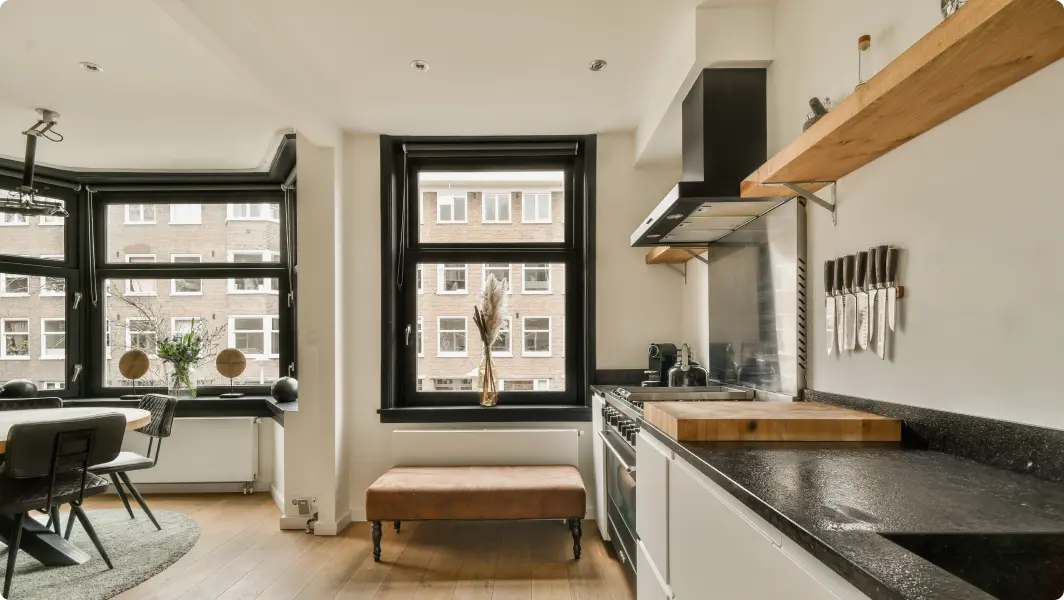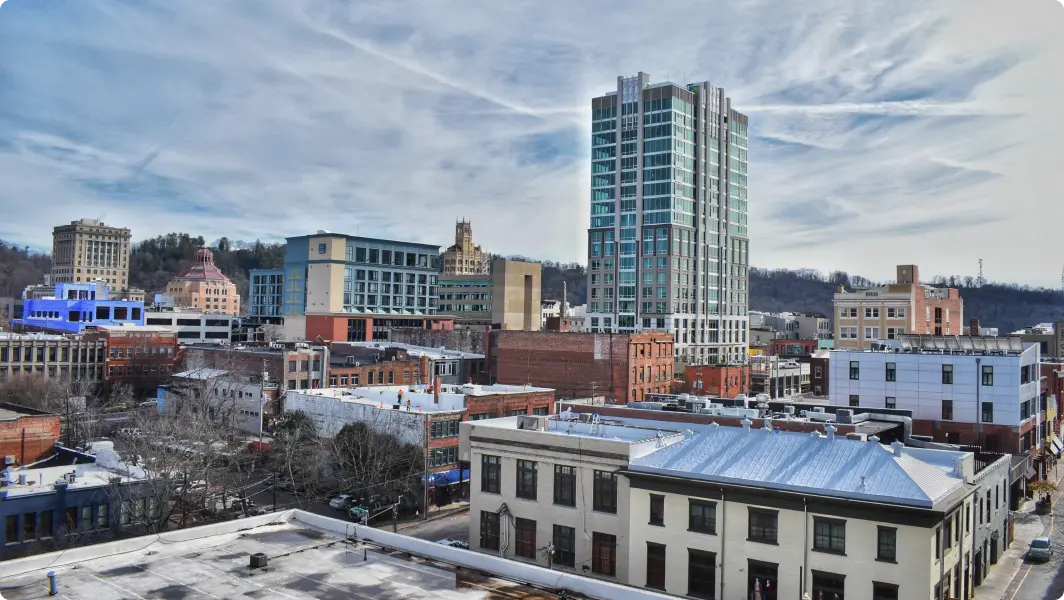
If you're a homeowner in Charlotte with a property sitting idle, the numbers warrant serious consideration.
Charlotte, North Carolina, represents an optimal market for Charlotte Airbnb and Charlotte short term rental investments. Year-round demand from corporate travelers, event attendees, and families ensures sustained 12-month booking cycles rather than seasonal tourism patterns. Bank of America Stadium, Charlotte Motor Speedway, major corporate conferences — this market operates on continuous visitor demand throughout the year.
Charlotte's central North Carolina location offers genuine accessibility advantages. Major attractions draw continuous visitor traffic, creating predictable property calendar fill rates. More importantly — Charlotte maintains a streamlined short term rental regulatory framework compared to other North Carolina markets.
While compliance requirements exist (zoning permit, business license, tax administration), Charlotte's permitting structure remains substantially more favorable than comparable markets with strict zoning restrictions and prohibitive compliance burdens.
If building passive income is your strategic objective, this represents one of the strongest market opportunities currently available.

Charlotte's visitor base is diverse — corporate teams, families, event attendees, remote workers, and students' parents. Each demographic segment demonstrates distinct preferences and booking patterns, meaning different neighborhoods serve fundamentally different purposes. Understanding which zone attracts which demographic enables strategic property positioning and occupancy optimization.
We've identified four primary rental markets in Charlotte, each with distinct demand profiles, pricing tiers, and guest composition. Whether you're targeting high-volume corporate bookings, family vacation accommodations, event-driven revenue spikes, or steady monthly income, a specific zone aligns with your property and revenue objectives.
Location: Downtown core, Central Business District — walking distance to Bank of America Stadium, Spectrum Center, and major corporate headquarters.
Uptown attracts the highest search volume in the Charlotte market — homeowners here average $220–$350/night, translating to $45,000+/year at 65% occupancy.
Market Drivers: Corporate headquarters concentration (Bank of America, Wells Fargo, Duke Energy) combined with Bank of America Stadium proximity. Business travelers dominate weekday occupancy; event attendees drive weekend demand concentration.
Primary Guest Demographics: Corporate professionals, sporting event attendees, and young professionals seeking urban amenities and nightlife.
Optimal Property Type: Sleek 1–2BR lofts with skyline views. Modern finishes and aesthetic appeal directly influence booking velocity and rate premiums.
Key Revenue Driver: Properties within 5-minute walking distance of Bank of America Stadium command $400+/night on event weekends, representing a 60% occupancy increase during game periods.
Location: South End, NoDa (North Davidson), Dilworth, and First Ward neighborhoods — arts district, brewery corridor, and walkable urban neighborhoods with LYNX transit access.
Downtown offers steadier income generation with lower revenue volatility — homeowners average $180–$300/night, translating to $38,000–$42,000/year at 60% occupancy.
Market Drivers: Authentic arts district programming (NoDa), craft brewery culture (30+ establishments within 5 miles), authentic local atmosphere distinct from corporate-focused Uptown. Less corporate intensity, more cultural and creative orientation.
Primary Guest Demographics: Families seeking cultural experiences, remote workers, foodies, creative professionals and artists.
Optimal Property Type: Family-friendly 2–3BR with adequate parking and yard access. Proximity to Freedom Park or cultural institutions (museums, galleries) enhances market appeal.
Key Revenue Driver: More consistent baseline bookings than Uptown, but lower rate peaks. Reduced event-driven volatility creates more predictable cash flow forecasting.
Location: Concord, NC — approximately 20 miles northeast of downtown Charlotte. Proximity to Carowinds Amusement Park, Concord Mills outlet mall, and Great Wolf Lodge.
The Charlotte Motor Speedway Area operates on fundamentally different economics — baseline rates are $150–$500/night, spiking to $600+/night during major racing events.
Market Drivers: Coca-Cola 600 (May), Bank of America ROVAL 400 (October), motorsports programming. Extreme seasonal intensity creates pronounced revenue concentration in 2–3 event months.
Primary Guest Demographics: NASCAR and motorsports enthusiasts, multi-generational family groups, and regional travelers attending specialized automotive events.
Optimal Property Type: 4+ bedroom homes with garage space, pool amenities, and RV parking. Group logistics and functional space take precedence over luxury finishes.
Key Revenue Driver: 40–60% of annual revenue concentrates in 2–3 event months. Single race weekends frequently cover multiple months of property carrying costs, making strategic event-period pricing critical.
Location: UNC Charlotte campus vicinity, University Research Park corridor — 15 minutes from Charlotte airport, connected via Greenway Trail network.
The University Area prioritizes occupancy reliability over revenue volatility — homeowners average $120–$220/night, translating to $35,000+/year at 55% occupancy.
Market Drivers: UNC Charlotte campus (29,000+ students), Research Park corporate training operations, predictable parent/alumni visit patterns. Demand patterns follow the institutional academic calendar rather than event-driven spikes.
Primary Guest Demographics: Parents visiting students, corporate training participants, remote workers, and budget-conscious families seeking regional vacation accommodations.
Optimal Property Type: Studio or 2BR with dedicated workspace, high-speed WiFi, and adequate parking. Functional amenities take priority over aesthetic upgrades.
Key Revenue Driver: Highest occupancy reliability among Charlotte markets. Approximately 50% of bookings represent 28+ night stays, creating predictable cash flow and reduced guest turnover management intensity.

Guest booking decisions fundamentally center on proximity to activities and experiences rather than property features alone. Properties positioned strategically near major attractions command premium rates and accelerated booking velocity.
Sporting events drive substantial booking spikes — NFL games increase bookings 60% during event weekends. Properties within walking distance command $400+/night premium rates on game days. Concert programming creates identical demand patterns. Panthers fans, touring artists, and corporate groups prioritize proximity to this venue.
Properties within 5-minute walking distance should position this proximity as the primary listing feature rather than a secondary amenity.
NBA games, major concert tours, and convention programming drive consistent demand. Corporate travelers prioritize proximity given expense account flexibility. International touring acts, WWE events, and major conferences bring concentrated visitor volumes.
Guests evaluate location efficiency — proximity, walkability, or quick transit access determines booking decisions over price consideration.
Interactive exhibits, racing history displays, and hands-on educational content attract sustained family visitation. Racing enthusiasts make destination pilgrimage visits. While less dramatic than stadium impact, this attraction maintains consistent off-season calendar fill.
Outdoor recreation programming (rafting, ziplines, and adventure activities) attracts younger demographic segments. Properties within 10 minutes proximity command booking premiums. Corporate team-building groups, adrenaline-seeking travelers, and active families book longer stays and provide consistently high satisfaction ratings.
Children's educational programming creates extended family stay patterns. Parents frequently book full-week accommodations specifically for this attraction. Guest satisfaction drives strong review scores — 80% of family guest reviews mention positive children's experiences when proximity to this venue exists.
Properties proximate to any of these attractions experience a +30–50% occupancy increase automatically. Competitive rate premiums become justified through guest demand concentration.
Operational Recommendation: Create a comprehensive local guide PDF with venue maps, visitor information, hours of operation, and transportation directions. Guests remain longer, submit elevated review ratings, and provide personal recommendations at a higher frequency. This single operational enhancement frequently represents the difference between 65% and 85% occupancy rates.

Strategic property-to-zone alignment directly impacts booking velocity and achievable rate premiums. Property characteristics must align with dominant guest demographics within specific neighborhoods.
Uptown: Sleek 1–2BR lofts with skyline views. Modern aesthetic, reliable WiFi connectivity, walkable urban location. Attracts corporate travelers, couples, and young professionals.
Downtown: Family-friendly 2–3BR with functional parking (frequently underestimated value), operational kitchens, adequate interior space, museums, and parks within walking distance.
Speedway: 4+ BR homes with garage space, pool amenities, and large garages. Group accommodations, families attending events, tailgate-culture participants. Pool presence justifies significant rate premiums during race events.
University Area: Studio or 2BR units with dedicated workspace, high-speed WiFi, and parking availability. Student parents, professional scholars, remote workers. Operational workspace quality directly impacts booking conversion — substandard WiFi creates booking cancellations.
Pet-friendly accommodations with fenced yard access command +20% nightly rate premiums. Guest demand reflects peace-of-mind value for animal security.
Sustainable features (solar panel systems, smart thermostats, and energy-efficient systems) attract premium-rate guests demonstrating willingness to pay 15–20% rate premiums for environmentally conscious accommodations.

Strategic property preparation directly correlates with calendar fill rates. Operational fundamentals establish a booking foundation. The amenities list on your profile, professional presentation, and authentic local guides transform casual browsers into confirmed bookings.
Operational Support: Triad Vacation Rentals manages property staging, professional photography, listing optimization, and dynamic pricing — enabling property owners to focus on guest satisfaction and income collection rather than administrative complexity.

Operating a short-term rental in Charlotte requires adherence to specific local and state regulatory requirements. While Charlotte maintains a relatively streamlined regulatory framework compared to major metropolitan markets, compliance is mandatory, and violations carry significant penalties.
Hosts are responsible for collecting and remitting multiple tax categories:
Important Note: While Airbnb and Vrbo typically handle tax collection and remittance on behalf of hosts, operators remain ultimately responsible for ensuring compliance. Operators must verify platform tax administration accuracy and maintain documentation of tax payments.
Non-compliance carries substantial consequences:
Regulatory enforcement includes inspections for occupancy violations, safety code compliance, zoning permit verification, and guest record audits.
Regulatory requirements demand ongoing attention — permit renewal ($100 annually), tax administration accuracy across three tax categories, property maintenance compliance, occupancy limit enforcement, and guest documentation maintenance. Operators who underestimate compliance complexity frequently face penalties, permit revocation, and substantial remediation costs.
Operational Advantage: Triad Vacation Rentals manages all permit acquisition, annual renewal, tax compliance administration, regulatory documentation, and code compliance verification — eliminating owner responsibility for complex legal requirements and enforcement risk.

Dynamic pricing implementation drives substantial revenue increases. Data-informed pricing generates $3,000+/month passive income for correctly positioned properties.
Real-time demand data, competitor rate positioning, and upcoming event programming require constant analysis. Properties that adjust rates daily based on market conditions achieve 20–30% higher revenue than static pricing. Speedway properties especially benefit — difference between the $275/night baseline and the $600/night event pricing requires strategic planning.
Managing multiple discount strategies while maintaining revenue optimization requires constant attention. Triad Vacation Rentals handles discount administration and rate adjustments based on demand, market conditions, and upcoming events — owners simply approve strategic promotional recommendations.

Predictable annual events drive seasonal revenue concentration, creating significant pricing opportunities. Strategic calendar planning and rate adjustments during peak periods generate 30–150% occupancy increases.
Speedway Area:
Uptown:
Downtown & University Area:
Block availability 3–6 months ahead of major events. Implement dynamic rate multipliers: +50–100% during high-demand weekends for event-driven zones. Speedway properties especially benefit — single race weekends frequently cover multiple months of carrying costs.
Automated Rate Optimization: Triad's event filter automatically adjusts rates during major programming periods — enabling +150% revenue generation during peak demand windows without owner intervention.

Q: Which Charlotte neighborhoods drive the highest Airbnb demand?
A: The highest demand concentrates in four zones: Uptown, Downtown, Speedway Area, and University Area. Together, they represent approximately 80% of Charlotte's short-term rental market demand
Q: What revenue levels are realistic for Uptown Charlotte properties?
A: Conservative projections indicate $45,000+/year at 65% occupancy for 1–2BR units. Properties within 5 minutes of the stadium achieve $400+/night on event weekends.
Q: Which market zone maximizes event-driven revenue potential?
A: Charlotte Motor Speedway Airbnb—race season properties achieve $600+/night during Coca-Cola 600 (May) and ROVAL 400 (October). 40–60% of annual revenue concentrates in 2–3 event months.
Q: What are the exact Charlotte short-term rental laws I need to follow?
A: You need a $100 zoning permit and business license and must collect 8% occupancy tax. Charlotte short-term rental laws require 2 adults per bedroom + 2 and one parking space per bedroom. Triad handles all compliance.
Q: How does one attract extended-stay bookings?
A: Target University Area or Downtown neighborhoods with 10% discounts for 28+ night bookings. Remote workers and corporate training participants respond strongly to extended-stay pricing. University Area specifically: 50% of bookings are 28+ night stays.

Charlotte's market is actively booking — corporate teams, event attendees, and families are continuously seeking accommodations. Every month your property sits empty, that income goes to someone else's calendar. Triad Vacation Rentals handles everything operational. You simply own the property and collect monthly income. The question isn't whether Charlotte's STR market works — it clearly does. The question is, will you capture your share?



Happy with Triad?
Leave us a quick Google review – it helps other homeowners find the support they need.